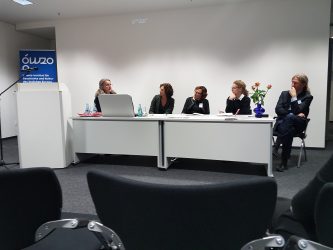
Socialist Internationalism & the Global Contemporary: Transnational Art Historiographies from Eastern and East-Central Europe
Leipzig, Leibniz-Institute für Geschichte und Kultur des östlichen Europa (GWZO), November 23–25, 2017
The international conference “Socialist Internationalism and the Global Contemporary” explores a possible alternative beginning of Global Art History and World Art Studies: methodologies that set a worldwide focus in the study of art around the 2000s. In the countries of the former Socialist Bloc, “universal art history” or Weltkunstgeschichte were introduced as frameworks for the teaching and writing of art history. Conference presentations interrogate a tentative link between socialist internationalism as a political and cultural diplomatic principle and the prevalent approaches to art historiography during Socialist times. Did “universal art history” and “world art history” as practiced in the “Second World” have aspirations and achievements comparable to those of Global Art History and World Art Studies today? Or, was this knowledge production in an internationalist paradigm a mere foil for communist rhetoric? In either case, did Socialist scholars come up with innovative propositions or a more inclusive canon? Equally importantly, whatever happened to this scholarly output: would it be possible to re-purpose particular aspects of it today?
PROGRAM
THURSDAY 23 November
3.30 pm Welcome Christian Lübke, Direktor (GWZO)
Frank Hadler, Head of Department “Entanglements and Globalization” (GWZO)
Arnold Bartetzky, Head of Department „Culture and Imagination“ (GWZO)
Introduction
Marina Dmitrieva (GWZO), Antje Kempe (Greifswald)
4.00–6.00 pm PANEL 1 TOWARDS A SOCIALIST WORLD ART HISTORY? Chair/Moderator: Beáta Hock (GWZO)
Corinne Geering (Gießen): Pluralism within regions: Soviet world art history in the context of international cultural policy
Michaela Marek (Berlin): Internationality as required. Italy vs. neighboring countries in Czech art historiography
Nikolas Drosos (Toronto): Realist International: Twentieth-century global Realism according to the Soviet Universal History of Art (1956–66)
6.00–6.30 pm Coffee break
6.30–8.00 pm Keynote address Anthony Gardner (Oxford): 1955: A Year of fragile legacies and possible directions
8.00–9.00 pm Reception
FRIDAY 24 November
9.00 am –1.00 pm
PANEL 2 FROM WORLDWIDE CULTURAL INTEGRATION TO ARTISTIC PLURALISM Chair/Moderator: Marina Dmitrieva (GWZO)
Elena Sharnova (Moscow): The concept of “Russian painting among European Schools” in Soviet-Russian art history, 1970-1990s
Maja and Reuben Fowkes (London/Budapest): Art history in a suitcase: The itinerary of art trends in socialist art criticism
Igor Dukhan (Minsk): “Il faut être absolument moderne”: The idea of contemporaneity in the Soviet Bloc’s art and architecture, 1955–80
11.00-11.30 am Coffee Break
11.30 am-1.00 pm
Chair/Moderator: Sandra Frimmel (Zürich)
Piotr Juszkiewicz (Poznan): Modern, primitive, folk and socialist. Mexican art in Polish art history and art criticism 1949–1972
Nadine Siegert (Bayreuth): “Socialist Angolanidade”: What did art history writing mean in the Angolan Socialist period?
1.00–2.30 pm Lunch Break
2.30–4.00 pm
PANEL 3 IDEOLOGICAL PROJECTIONS AND THE PAST Chair/Moderator: Tanja Zimmermann (Leipzig)
Ivan Gerát (Bratislava/Trnava): Military saints between universal archetypes and historical functions
Olga Etinhof (Moscow): The study of Byzantine art in the USSR in the second half of the 20th century
4.00-4.30 pm Coffee Break
4.30-6.30 pm PANEL 4 SOCIALIST INTERNATIONALISM AS HEURISTIC TOOL Chair/Moderator: Arnold Bartetzky (GWZO)
Matteo Bertelé (Venice/Leipzig): Showcasing international Socialism: The Exhibition of Socialist Countries (1958)
Douglas Gabriel & Adri Kácsor (Chicago): Knowledge in fraternity: Socialist art and architecture between Budapest and Pyongyang in the 1950s
Adam Mayer (Hewler): Naija Marxism before and after 1989: Revolutionary thought and art in a comparative perspective
SATURDAY 25 November
10.00 am –2.15 pm PANEL 5 NETWORKS OF KNOWLEDGE PRODUCTION Chair/Moderator: Katja Bernhardt (Berlin) and Robert Born (GWZO)
Éva Forgács (Pasadena): Efforts for a European integration of the arts and the art discourse, 1945–48
Krista Kodres (Tallinn): Translations: Disseminating Socialist art history in the 1960s
Mari Laanemets (Tallinn): World art history from an Eastern perspective: Eastern European contributions to the debates within AICA in the 1970s
12.00 am–1.00 pm Lunch Break
1.00–2.15 pm Olga Olkheft (Leipzig): Re-evaluation: Moscow–Paris: 1900–1930 as a turning point in Soviet art history
Virve Sarapik (Tallinn): CIHA congresses and Soviet internationalism
2.15 pm FINAL DISCUSSION & CONCLUSION
VENUE
GWZO, Specks Hof (Entrance A, 4th floor)
Reichsstraße 4, 04109 Leipzig
See the conference booklet here.
CONCEPT AND COORDINATION: Marina Dmitrieva (GWZO), Beata Hock (GWZO), Antje Kempe (University of Greifswald).
In cooperation with the Institute of Art History and Visual Culture at the Estonian Academy of Arts, Tallinn (Krista Kodres, Kristina Jõekalda) and the Chair of Art History of Eastern Europe at the Humboldt University of Berlin (Michaela Marek).
CONTACT
Marina Dmitrieva marina.dmitrieva@leibniz-gwzo.de
Beata Hock beata.hock@leibniz-gwzo.de
Antje Kempe antje.kempe@uni-greifswald.de
Supported by GWZO and Leibniz Science Campus “Eastern Europe”
